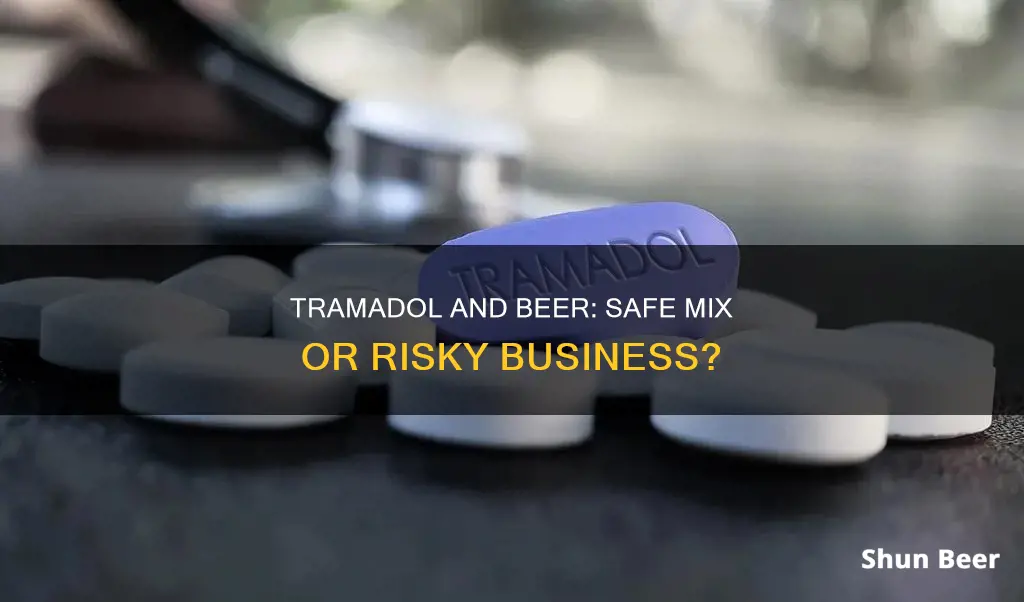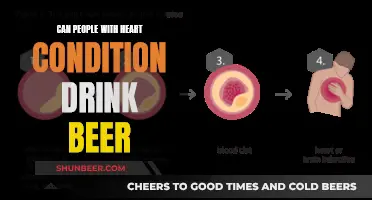
Tramadol is a synthetic opioid, a drug that acts on the central nervous system to alleviate pain. It is often prescribed to treat moderate to severe pain, such as postoperative discomfort or chronic conditions. While it has a low potential for dependence compared to other opioids like morphine, it can still be addictive when used for prolonged periods. When taken as prescribed, its most common side effects are nausea, dizziness and vomiting.
Alcohol is also a central nervous system depressant. When combined with tramadol, the effects of both substances are intensified, leading to increased sedation, impaired cognitive function, respiratory depression, and gastrointestinal issues. The combination can also lead to severe oxygen deprivation, long-term brain damage, and even death.
Due to these dangerous side effects, it is not recommended to consume alcohol while taking tramadol. If you have already consumed alcohol, it is advisable to wait at least 24 hours before taking tramadol. If you have taken tramadol, it is best to refrain from drinking alcohol until its effects have completely worn off.
| Characteristics | Values |
|---|---|
| Should you take tramadol and drink beer? | No |
| Why? | Increased risk of side effects, including the risk of a deadly overdose on either substance |
| What are the side effects? | Problems concentrating, cognitive impairment, problems with judgment, coordination difficulties, excessive sedation, slowed breathing, coma, death |
| What are the severe side effects? | Addiction or dependence, respiratory problems or depression, oxygen deprivation, long-term brain damage |
| What are the signs of overdose? | Loss of consciousness or seizure activity, slow breathing or shallow breaths, pale or blue skin colour, increased heart rate, excessive sleepiness, loss of muscle control |
| What are the signs of addiction? | Cravings or intense urges to use, developing a tolerance, experiencing withdrawal symptoms when attempting to quit, an inability to stop or cut back on substance use, spending much time obtaining/using/recovering from the effects of tramadol or alcohol, continuing use despite persistent interpersonal or social problems |
What You'll Learn
- Tramadol and alcohol are central nervous system depressants, which can slow down brain function
- Mixing the two substances can lead to a fatal overdose
- Side effects of mixing tramadol and alcohol include problems with concentration, cognitive impairment, poor judgement, and coordination difficulties
- Tramadol and alcohol can cause serotonin syndrome, which includes symptoms such as agitation, confusion, abnormal eye movements, fever, and diarrhoea
- Mixing the two substances can lead to long-term brain damage

Tramadol and alcohol are central nervous system depressants, which can slow down brain function
Tramadol is an opioid that acts on the central nervous system to alleviate pain. It is often prescribed to treat moderate to severe pain, such as postoperative discomfort or chronic conditions. When taken as prescribed, its most common side effects are nausea, dizziness and vomiting. However, it is important to note that tramadol is a synthetic opioid and, as such, it can be dangerous when mixed with other substances, especially central nervous system depressants like alcohol.
Tramadol and alcohol are both central nervous system depressants, which means they can slow down brain function when combined. This can lead to a range of side effects, including problems with concentration, cognitive impairment, poor judgment, and coordination difficulties. The combination of these two substances can also result in excessive sedation, slowed breathing, coma, and even death. For this reason, it is strongly advised that individuals do not consume alcohol while taking tramadol.
The primary risk of drinking while taking tramadol is the worsening of central nervous system depressant side effects. In addition to excessive sedation and slowed breathing, individuals may experience increased blood pressure, seizures, hypothermia, hypertension, kidney damage, and stroke. The combination of tramadol and alcohol can also lead to severe oxygen deprivation, resulting in long-term brain damage.
The severity of these side effects will depend on the amount of alcohol consumed and the dosage of tramadol taken. However, it is important to note that even small amounts of alcohol can be dangerous when mixed with tramadol. This is because the combination of these two substances can be highly addictive, luring individuals into a false sense of security and leading them to consume more than their body can handle.
If you or someone you know is struggling with addiction to tramadol, alcohol, or both, it is important to seek professional help. Treatment options are available, including medical detox, inpatient and outpatient treatment, behavioural therapies, and dual diagnosis treatment for co-occurring disorders. It is crucial to take that first step and reach out for help, as the combination of tramadol and alcohol can have severe and potentially fatal consequences.
Beer and Fishing: A Match Made in Heaven?
You may want to see also

Mixing the two substances can lead to a fatal overdose
Tramadol is a synthetic opioid that is often prescribed to treat moderate to severe pain. It is meant to be taken as directed by a licensed medical professional. It is dangerous to mix tramadol with other central nervous system (CNS) depressants, such as alcohol, as this can lead to a fatal overdose.
Both tramadol and alcohol are CNS depressants, which means they can slow down brain function when combined. This can lead to increased sedation, respiratory depression, and slowed breathing, which can be life-threatening and result in a coma or even death. The risk of a fatal overdose is further heightened when tramadol is used with other CNS depressants, such as opioids, benzodiazepines, or street drugs.
Mixing tramadol and alcohol can also lead to other severe side effects, including addiction or dependence, increased blood pressure, liver damage, cardiovascular issues, and gastrointestinal issues. The severity of these side effects typically depends on the amount of alcohol consumed and the dosage of tramadol.
It is important to seek emergency medical treatment if you suspect someone is overdosing on tramadol or alcohol. Additionally, if you or someone you know is struggling with an addiction to alcohol, opioids, or both, it is crucial to seek professional help.
Oregon's Deli Drinking Laws: Beer with Your Sandwich?
You may want to see also

Side effects of mixing tramadol and alcohol include problems with concentration, cognitive impairment, poor judgement, and coordination difficulties
Mixing tramadol and alcohol can have a detrimental impact on cognitive function, including concentration and coordination. When combined, these substances can impair memory, concentration, and coordination, increasing the risk of accidents and injuries.
Tramadol is an opioid that acts on the central nervous system to alleviate pain. It binds to mu-opioid receptors in the brain, inhibiting pain signals. Alcohol is also a central nervous system depressant, and when mixed with tramadol, the effects of both substances are intensified. This can lead to excessive sleepiness or even unconsciousness. The combination can also result in poor judgment and cognitive impairment, further increasing the risk of accidents or engaging in risky behaviours.
The side effects of mixing tramadol and alcohol go beyond problems with concentration and coordination. It can also lead to respiratory depression, where breathing becomes dangerously slow or shallow, and in severe cases, can result in respiratory failure, coma, and even death. Additionally, this combination can cause gastrointestinal issues such as nausea, vomiting, and stomach upset.
The long-term effects of mixing tramadol and alcohol are also concerning. Both substances can lead to the development of tolerance, where higher doses are needed to achieve the desired effects. This can result in physical and psychological addiction, with individuals experiencing withdrawal symptoms if they try to stop using either substance. Liver damage and cardiovascular issues are also possible long-term consequences of chronic use of this combination.
CBD Oil and Beer: Is It Safe?
You may want to see also

Tramadol and alcohol can cause serotonin syndrome, which includes symptoms such as agitation, confusion, abnormal eye movements, fever, and diarrhoea
Tramadol is an opioid pain medication that is often prescribed to treat moderate to severe pain. It is meant to be taken as directed by a licensed medical professional. When taken as prescribed, its most common side effects are nausea, dizziness, and vomiting. However, it is crucial to avoid consuming alcohol while taking tramadol. Both tramadol and alcohol are central nervous system depressants, which means they can slow down brain function when combined. This combination can lead to intensified side effects, including problems with concentration, cognitive impairment, impaired judgment, and coordination difficulties. More dangerously, it can result in extreme sedation, respiratory depression, coma, and even death.
Additionally, the combination of tramadol and alcohol can lead to a life-threatening condition known as serotonin syndrome. Serotonin syndrome is caused by excess serotonergic activity, resulting in altered mental status and heightened neuromuscular and autonomic activity. The risk of developing serotonin syndrome is increased when taking multiple medications or misusing tramadol. This syndrome includes various symptoms, such as agitation, confusion, abnormal eye movements, fever, and diarrhoea. Other symptoms may include muscle spasms, shivering, tremors, ataxia, increased sweating, hyperreflexia, and myoclonus.
To reduce the risk of serotonin syndrome, it is crucial to avoid co-prescribing tramadol with certain serotonergic medications, such as monoamine oxidase inhibitors, SSRIs, tricyclics, and venlafaxine, among others. Additionally, tramadol should be avoided in patients with a history of seizure disorders or epilepsy, as it can lower the seizure threshold. It is important to consult a medical professional if you are taking multiple medications or have a history of seizures to ensure the safe use of tramadol.
Ginger Beer Before a Colonoscopy: Safe or Not?
You may want to see also

Mixing the two substances can lead to long-term brain damage
Mixing tramadol and alcohol can have severe consequences, including long-term brain damage. Both substances are central nervous system depressants, which means they can slow down brain function when combined. This can lead to a range of side effects, including problems with concentration, cognitive impairment, poor judgment, and coordination difficulties.
The combination of tramadol and alcohol can also cause respiratory depression, which can be life-threatening. Severe oxygen deprivation can quickly result in a coma or become fatal. Additionally, the risk of a fatal overdose is increased when tramadol is used with alcohol. This is because both substances affect the respiratory system, slowing down breathing, which can lead to respiratory failure, coma, and death.
The long-term effects of mixing tramadol and alcohol can include increased tolerance, physical and psychological addiction, liver damage, and cardiovascular issues. Chronic use of both substances can lead to the body becoming reliant on them to function normally, and withdrawal symptoms can be dangerous and require medical supervision.
It is important to note that even a small amount of alcohol can be dangerous when mixed with tramadol. If you are taking tramadol, it is recommended to refrain from drinking alcohol completely. If you have already consumed alcohol, it is advisable to wait at least 24 hours before taking tramadol.
Stag Beer and Diabetes: Is It Safe to Drink?
You may want to see also
Frequently asked questions
No, it is not safe to drink alcohol while taking tramadol. Both substances are central nervous system depressants, and mixing them can lead to dangerous side effects, including respiratory depression, slowed breathing, extreme sedation, coma, and even death.
Mixing tramadol and alcohol can result in various side effects, including drowsiness, dizziness, reduced coordination, lowered blood pressure, decreased heart rate, poor decision-making, loss of consciousness, and seizures. It can also increase the risk of psychosis, anxiety, delusions, mania, paranoia, andsection.
Tramadol and alcohol are central nervous system depressants, so combining them can intensify their sedative and respiratory depressing effects. This can lead to unconsciousness, coma, respiratory arrest, overdose, or even death. Additionally, both substances can increase blood pressure and create a false sense of security, leading to overconsumption.
If you have mixed tramadol and alcohol and are experiencing any potential overdose symptoms, seek immediate medical attention. Call emergency services or go to the nearest hospital, and provide detailed information about the substances you have consumed, including the amounts and timing.







